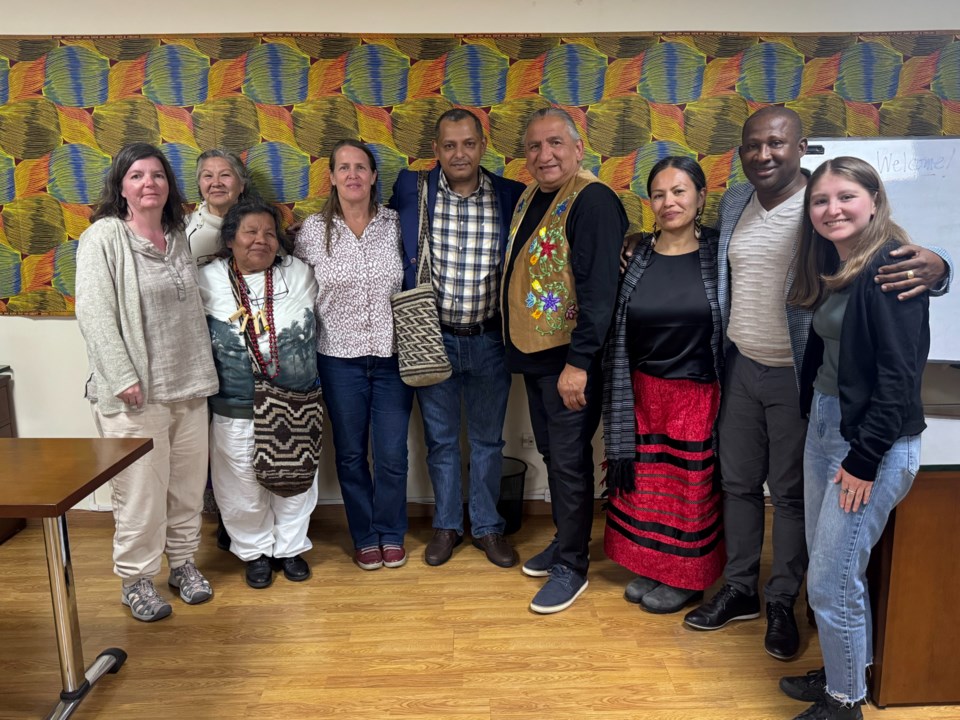Delegates from Algoma University took part in a visit to Colombia last month to help deepen the understanding of decolonial approaches to peace-building, commitments to further relationships, and exploration of collaboration for implementing the Ethnic Chapter.
Through ceremony, high-level meetings, educational and cultural exchanges in Bogota (Muisca ancestral lands) and the territories of the Arhuaco Nation of the Sierra Nevada de Santa Marta, the delegation strengthened partnerships with Indigenous and Afro-Colombian communities and organizations, advancing shared goals in environmental governance, self-determination, and decolonial education.
For more information, see the press release below.
Last month, a delegation from the Institute of Peoples, Territories, and Pedagogies for Peace (IPTP), in collaboration with the Faculty of Cross-Cultural Studies (FCCS) at Algoma University, Anishinaabe leaders and community members from Baawaating, Turtle Island, and international allies, returned from an impactful visit to Colombia.
Through ceremony, high-level meetings, educational and cultural exchanges in Bogota (Muisca ancestral lands) and the territories of the Arhuaco Nation of the Sierra Nevada de Santa Marta, the delegation strengthened partnerships with Indigenous and Afro-Colombian communities and organizations, advancing shared goals in environmental governance, self-determination, and decolonial education.
The delegation began in Bogota, with a ceremony in the mountain of Guayachia, followed by a meeting with the Ethnic Commission for Peace and Defense of Territorial Rights, a national-level organization representing Indigenous and Afro-descendant peoples in the implementation of the Ethnic Chapter, 2016 Peace Accords, in ancestral territories. Parallels were discussed in experiences and resistance to colonization across the Americas and the projection of self-determination rooted in ancestral forms of governance and cosmovision. Key outcomes of the visit included a deepened understanding of decolonial approaches to peace-building, commitments to further relationships, and exploration of collaboration for implementing the Ethnic Chapter. Anishinaabe leaders were invited to support the Commission's efforts directly, reinforcing commitments to Indigenous self-determination globally.
In the ancestral territories of the Arhuaco people (Sierra Nevada of Santa Marta), sessions were held to deepen the understanding of Indigenous history, knowledge, and intercultural and decolonial education. The vital role of women as weavers of knowledge, local economic production and environmental protection was explored. During the Environmental Forum hosted by the Arhuaco community of Jimain– home to Indigenous authority Ramon Hernandez, who visited Baawaating and Algoma University last June– Indigenous and Afro-descendant leaders gathered alongside IPTP staff and academics from Algoma University, partner university - the National University of Colombia (UNAL), and CorporoCesar (a departmental environmental body).
A national and global “Inter-ethnic Alliance for the Protection of Life, Biodiversity and Mitigation of Climate Change“ was launched at the forum. This initiative aims to unite Indigenous and Black-Afrodescendant communities and authorities from Colombia, the Americas and internationally. It seeks to strengthen knowledge, governance, and economic systems to foster global recognition of the environmental role and self-determination of Indigenous and Black-Afrodescendant peoples in protecting their territories, lands and waters. The alliance also sets out to address critically important challenges facing the planet and communities directly hit by changing climate and biodiversity loss.
The delegation also met with other key Indigenous and Afro-Colombian organizations, including the National Indigenous Organization of Colombia (ONIC), the Black Communities Process (PCN), the Organization of Indigenous Peoples of the Colombian Amazon (OPIAC), and a thesis class from the University of Rosario, within the context of a signed agreement with Algoma and the IPTP. These discussions strengthened commitments to Indigenous rights, environmental sustainability, and cross-cultural education, deepening ties between communities and the educational sector in Canada and Colombia.
In March 2025, the delegation’s work will continue through ongoing collaboration and strategic initiatives. As part of a study abroad opportunity in Colombia led by Dr. Sheila Gruner, Algoma University students will participate in a course in Bogota and a second Inter-Ethnic Environmental Forum to be held in Arhuaco territory. This visit will contribute to the development of governance strategies and the strengthening of cross-cultural partnerships. Efforts to advance the interethnic alliance framework will continue, fostering deeper collaboration between Colombian and Canadian Indigenous and Afro-descendant leaders on biodiversity protection and climate action.
To learn more about the IPTP, visit their website.
